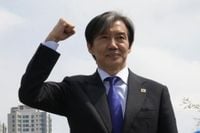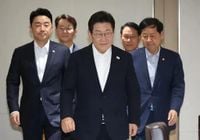In a sweeping and controversial move ahead of South Korea’s Liberation Day, President Lee Jae Myung has granted special pardons to a host of high-profile political and business figures, a decision that is already sending shockwaves through the nation’s political and corporate landscapes. Among those pardoned are former Justice Minister Cho Kuk, senior Samsung executives, and former lawmaker Yoon Mee-hyang—each figure at the center of scandals that have gripped the country in recent years.
The announcement, made on August 12, 2025, comes just days before the 80th anniversary of Korea’s liberation from Japanese colonial rule, a moment traditionally marked by reflection and national unity. Yet, this year’s commemorations are set against a backdrop of public controversy and political maneuvering, as the president’s decision to grant clemency to such divisive figures has sparked heated debate about justice, fairness, and the future direction of the country.
Chief among the pardoned is Cho Kuk, a former justice minister and close ally of ex-President Moon Jae-in. Cho was convicted in December 2024 of academic fraud involving his children and unlawful interference with a government inspection—a scandal that ignited widespread protests in 2019 and forced his resignation. He had been serving a two-year prison term, but the pardon now cuts that short and restores his civil rights, opening the door for a political comeback that could reshape the ruling Democratic Party (DP) and the broader political landscape ahead of the June 2026 local elections.
According to the Associated Press, President Lee justified the pardons as a means to “promote political unity” after a period of divisive politics, including the ousting of conservative President Yoon Suk Yeol earlier this year following his controversial martial law declaration. Yet, the move has not been universally welcomed. The conservative People Power Party accused Lee of “arrogance and abusing his presidential powers to release and reinstate Cho, who trampled on the fairness and common sense of future generations.” Such criticism reflects the deep scars left by the Cho scandal, particularly among young and centrist voters who had rallied against perceived hypocrisy in the Moon administration’s calls for fairness and social justice.
The DP itself is divided. A lawmaker from the greater Seoul region, speaking to Yonhap, warned, “Cho’s special pardon will negatively affect the DP’s already weak support among young voters. The president will take responsibility politically, but the youth feels betrayed by this decision.” The minor Justice Party was even more scathing, declaring in a public statement that Lee’s decision “lacks public consensus” since Cho had never apologized or acknowledged his wrongdoing.
Political observers suggest that Cho’s return could pose a dilemma for the DP, especially with local elections looming. His minor Rebuilding Korea Party has already demonstrated its potential, defeating the DP in the April 2025 by-election for Damyang county chief in South Jeolla Province—even in his absence. There is mounting speculation that Cho could run for mayor in Seoul or Busan, or contest a parliamentary seat in Incheon Gyeyang-B, Lee’s former constituency. Such moves could split the ruling bloc’s vote in key battlegrounds, complicating the DP’s ambitions for a sweeping victory.
Yet, President Lee’s calculation appears to be that rejecting the pardon could have triggered an even greater backlash, given growing public support for Cho’s clemency among political and religious circles, and a public call for leniency from former President Moon. According to Yonhap, Lee may also have sought to avoid accusations of election interference had the pardon been delayed until the end of the year.
Pro-Lee lawmakers have hailed the pardon as a symbolic step in the president’s prosecutorial reform drive, aimed at reversing what they see as politically motivated investigations under the previous Yoon government. Senior DP spokesperson Park Soo-hyun said, “Cho had to endure great hardship and suffering due to the political prosecution’s unreasonable investigation and indictments. It is only right to restore the honor of the victims of political prosecution and to put such prosecutors back in their place.” Rep. Kang Deuk-gu echoed this sentiment, describing the pardon as the “end of the insurrection and restoring of democracy,” and a step toward national unity.
Cho was not the only controversial figure to receive clemency. More than 830,000 people are set to benefit from the Liberation Day pardons, including Cho’s wife, Chung Kyung-sim, who received a suspended sentence for forging documents related to her son’s college admission; former lawmaker Choe Kang-wook, convicted of issuing a false internship certificate for Cho’s son; and former Rep. Youn Mee-hyang, who was convicted of embezzling funds donated to support women forced into wartime sexual slavery by Japan during World War II.
The Korea Times editorial was blunt in its criticism, arguing that the pardons “have backfired by tarnishing the significance of the 80th anniversary of national liberation and are seen as politically motivated.” The editorial further contended that the move undermines judicial outcomes and has caused public controversy, sentiments echoed by many across the political spectrum.
The business world has also felt the impact of President Lee’s sweeping clemency. According to JoongAng Ilbo and Newspim, the pardons included former senior executives from Samsung’s Future Strategy Office, who had been convicted alongside Samsung Electronics Chairman Jae-Yong Lee over a decade ago on bribery charges linked to former President Park Geun-Hye. While many were paroled by March 2022, their civil rights had not been restored until now. The current pardons are widely seen as resolving a judicial crisis that has troubled Samsung Electronics for years, restoring the ability of these executives to participate fully in business and civic life.
SK Group leadership also benefited. Relatives of SK Group chairman Tae-Won Chey, including former SK Networks chairman Shin-Won Choi—who was serving a two-and-a-half-year sentence for embezzlement and breach of trust involving approximately KRW 223.5 billion (US$160.9 million)—were among those pardoned, with their remaining sentences waived and civil rights restored.
All told, President Lee’s Liberation Day pardons have touched nearly every corner of South Korean public life, from politics to business. The stated goal, according to the presidential office, was to “ease social tensions heightened by former President Yoon Suk Yeol’s martial law declaration last December and to help revive the stagnant economy.” Whether these sweeping pardons will truly foster unity and economic renewal remains to be seen. For now, they have reignited fierce debates about justice, fairness, and the proper use of presidential power in South Korea’s still-evolving democracy.
As the nation marks its 80th year of liberation, the echoes of these decisions will undoubtedly shape the country’s political and social landscape for months—if not years—to come.


